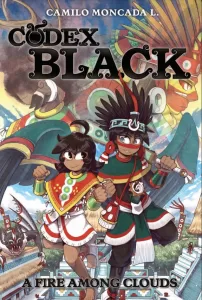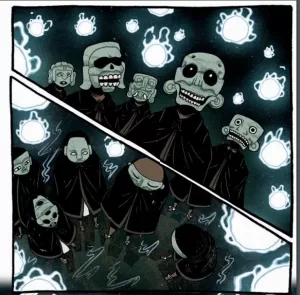When I was young, I was very much into Greek mythology. I read a lot of the for-kids versions of stories of Hercules, Zeus, Hera, Poseidon, and many others. I was fascinated by the tales of the powerful, but petulant and petty gods and the poor mortals they would toy with. I think I saw the old Clash of the Titans film about a dozen times, probably because it was one of the six movies that the First Choice network in Canada showed regularly. (I also saw Rocky III about 15 times for similar reasons.)
So while I knew a lot about the Greek gods, I didn’t know a lot about mythologies from other lands. When I got a little older, I read more about the Norse gods, like Odin, Thor, and Loki, but I still was very ignorant about the mythology of my native continent. The indigenous peoples of this hemisphere have rich and complex tales of the gods and deities that shaped their cultures.
Fortunately, we now have the colorful and exciting graphic novel Codex Black to help fill in those gaps.

Written by Camilo Moncada Lozanzo, with colors by Angel DeSantiago and based on their web comic, the story takes place in 15th century Mesoamerica. (This is the area that today would cover Southern and Central Mexico and much of Central America.) The story follows Donaji, a 15 year old girl leaving her village for the first time to track down her father, who disappeared on one of his regular trips to the nearby city to trade goods. The only thing of her father’s she has is his old poncho. Fortunately, the poncho is the current home of a god that gives Donaji great strength. On her journey, she comes across Itzcacalotl, an 18-year-old Mexica warrior who got separated from his caravan and somehow gained the wings of a crow (which can come in quite handy, as you’d imagine.)
They join forces and both look for Donaji’s father, all the while noting the strange things happening in their land. There are warring nations on the march, a strange cabal dressed in black robes that looks to be up to no good, and many appearances by petty and angry gods. (I guess some things are the same in every region.)

The artwork is beautiful and dynamic, showing off the swoops of Itzcacalotl’s wings and the whooshes of feet and fists from Donaji in combat. It also displays some real artistry in portraying some of the more gruesome beings that inhabit the pantheon. (There’s a creature called The Night Axe that is honestly terrifying.) The layout moves along briskly and the 300+ pages of the book pass quickly.
The two main characters play well together. Donaji’s bravery is a front for some pretty severe imposter syndrome. Itzcacalotl is still trying to figure out why he’s alive and was chosen to receive his wings. These two people with serious psychic wounds achieve a real friendship and grow to rely on each other. Plus there are many more colorful characters they encounter on their journey, like a young thief who also gets assistance from gods of her own.
My main critique of this volume is that there is a lot of table setting, but not enough story. There are a lot of plot threads being put into play that look very important but don’t get explored fully enough. Several characters get a hero’s intro, with a big splash page and text explaining who they are and what powers they have, only to have what amounts to an extended cameo. I assume they are returning in later volumes, but here it really leaves you feeling like this ended mid-chapter.
Still, since I wanted to find out what happened to them, I take that as a good sign that you should check out the second volume when it arrives.
This story is aimed for YA readers, but can be enjoyed by all who have an interest in adventure and myths and legends of different cultures.
4 out of 5
